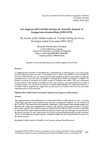Identificador persistente para citar o vincular este elemento:
https://accedacris.ulpgc.es/jspui/handle/10553/70272
| Título: | Los ingresos del Cabildo Insular de Tenerife durante el franquismo desarrollista (1959-1972) | Otros títulos: | The Income of the Cabildo Insular de Tenerife During the Era of Developmentalist Francoism (1959–1972) | Autores/as: | Hernández Pacheco, Ruymán | Clasificación UNESCO: | 55 Historia | Palabras clave: | Cabildo Insular de Tenerife Hacienda local Ingresos Recursos fiscales Local Treasury, et al. |
Fecha de publicación: | 2020 | Publicación seriada: | Vegueta: Anuario de la Facultad de Geografía e Historia | Resumen: | La implementación del Plan de Estabilización y Liberalización de 1959 dio paso a una nueva etapa en la que España recuperó su senda de crecimiento, que se había visto debilitada tras el estallido de la Guerra Civil. Ello hizo que las corporaciones locales españolas pudieran incrementar sus ingresos presupuestarios y que, por tanto, se ampliara el margen para realizar inversiones. El objetivo del trabajo es analizar la fiscalidad del Cabildo Insular de Tenerife entre 1959 y 1972 para determinar en qué medida el ente insular se benefició de este nuevo marco y qué repercusiones tuvo sobre la economía insular. A la vista de los resultados, se sustentó especialmente en la imposición indirecta, y el arbitrio sobre la importación y exportación de mercancías se consolidó como el recurso fiscal más importante para las arcas insulares. The implementation of the Stabilization and Liberalization Plan of 1959 ushered in a new era during which Spain got back onto its path towards growth, a progression hindered by the outbreak of the Civil War. This meant that local Spanish corporations could increase their income budget and, therefore, the margin for investment also increased. The objective of the present study is to analyse the taxation system of the Cabildo Insular de Tenerife between 1959 and 1972, in order to determine to what extent the insular entity benefited from this new framework and what repercussions it had on the island’s economy. In view of the results, the Cabildo sustained itself primarily by indirect taxation, and tax on the import and export of goods established itself as the most important fiscal resource for the insular treasury. |
URI: | https://accedacris.ulpgc.es/handle/10553/70272 | ISSN: | 1133-598X | Fuente: | Vegueta: Anuario de la Facultad de Geografía e Historia [eISSN: 2341-1112], n. 20, p. 339-369 |
| Colección: | Artículos |
Visitas
34
actualizado el 10-ene-2026
Descargas
39
actualizado el 10-ene-2026
Google ScholarTM
Verifica
Comparte
Exporta metadatos
Los elementos en ULPGC accedaCRIS están protegidos por derechos de autor con todos los derechos reservados, a menos que se indique lo contrario.
